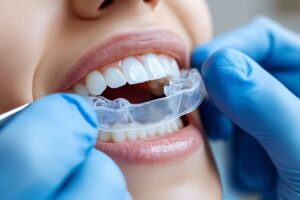Mouth Modification: Adjusting to Your Nightguard
August 7, 2024

If you have ever woken from a long night’s sleep only to realize you feel more drained than when you went to bed, you might be suffering from sleep apnea. This chronic sleep disorder blocks or hinders your airflow while you snooze, which interrupts your circadian rhythm. As a result, you can experience grogginess, general fatigue, mood swings, headaches, memory issues, and other challenges during the day.
Thankfully, your dentist can provide an oral device to help, like a nightguard. This helps reposition your jaw so you can inhale and exhale freely. However, it’s not uncommon for patients to struggle to get quality rest as they adjust to their new appliances. Continue reading to learn some helpful information that can ease your way through this transition!
Do Nightguards Cause Discomfort?
Some patients worry that wearing their nightguard will cause more problems than it alleviates. Although it can open your airway and help you get enough oxygen, you might also experience the following symptoms when you start wearing it regularly:
- Tightness or tenderness. The hard plastic in your mouth can feel unnatural at first, but the tension it’s applying ensures that it can fulfill its purpose without falling out while you dream.
- Gagging. If you have a sensitive gag reflex, you might have a harder time putting on your nightguard.
- Drooling. Your mouth creates more saliva when you put a large object into it because it doesn’t know the difference between your prosthetic and food.
- Nighttime removals. Some patients subconsciously take their appliance out at night and find it somewhere else- like across the room- the following day.
How Can I Adjust to My Nightguard?
It can feel disheartening when the solution to your sleeplessness causes additional issues, but fortunately, most patients acclimate in about 2 to 3 weeks. For example, over time, the brain begins to recognize the new sensations of wearing a nightguard and stops producing excessive saliva.
Wearing their appliance for short periods during the day can help those with an overly sensitive gag reflex. Try breathing through your nose as you focus on allowing all the muscles in your body to relax. With enough repetition, you can reduce your body’s reaction when you insert your nightguard, as it learns that it’s not under threat.
If you find that you’re experiencing long-term problems, the best course of action is to contact your dentist. They can work with you and any necessary sleep experts to ensure you get a quality night’s rest!
About the Author
Dr. Bob Heil has more than 20 years of experience helping people of all ages improve their quality of life by enhancing their oral health. He earned his Doctor of Dental Surgery at the University of Minnesota, and is a current member of the American Academy of Dental Sleep Medicine and other professional organizations. He provides a full range of services, including help with sleep apnea, to meet all your needs conveniently under one roof. His upscale, modern office is equipped with state-of-the-art technology so he can quickly diagnose issues and provide accurate, long-lasting solutions. You can request an appointment on the website or call (920) 235-0320.
No Comments
No comments yet.
RSS feed for comments on this post.
Sorry, the comment form is closed at this time.
